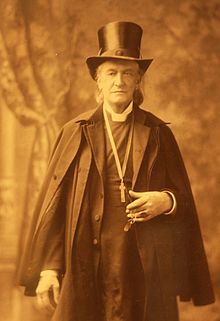Henry Whipple
| Henry Benjamin Whipple | |
|---|---|
| Bishop of Minnesota | |

Whipple in 1898
|
|
| Church | Episcopal Church in the United States of America |
| See | Episcopal Diocese of Minnesota |
| In office | 1859–1901 |
| Successor | Samuel C. Edsall |
| Orders | |
| Ordination | July 16, 1850 |
| Consecration | October 23, 1859 |
| Personal details | |
| Born | February 15, 1822 Adams, New York |
| Died | September 16, 1901 Faribault, Minnesota |
| Spouse | Cornelia Wright, Evangeline Marrs Simpson |
Henry Benjamin Whipple (February 15, 1822 – September 16, 1901) was the first Episcopal bishop of Minnesota, a humanitarian and an advocate for Native Americans.
Born in Adams, New York, he was raised in the Presbyterian church but became an Episcopalian through the influence of his grandparents and his wife, Cornelia, whom he married in 1842. Whipple attended Oberlin College from 1838–1839 and worked in his father's business until he was admitted to holy orders in 1848.
After ordination Whipple served parishes in Rome, New York and Chicago, where he gained a reputation for his service to poor immigrant groups. His Chicago ministry drew him to the attention of the newly formed Episcopal Diocese of Minnesota which elected him its first bishop in 1859. He served until his death in 1901.
Although concerned with establishing his denomination in the new state of Minnesota, Whipple soon began to champion the cause of Native American groups in the state against what he saw as an abusive and corrupt Federal policy towards Indians. He is best known for his clemency pleas in favor of a group of Dakota or Sioux who fought against the United States government in the U.S.-Dakota War of 1862 in the area around New Ulm, Minnesota. On December 26, 1862, the largest mass execution in U.S. history occurred in Mankato following the war's end. Thirty-eight Dakota Amerindians were hanged for participation in the conflict. A total of 303 were sentenced to be hanged but President Lincoln pardoned 265 at Whipple's urging. Lincoln's intervention was not popular at the time. Two commemorative statues are located on the site of the hangings (now home to the Blue Earth County Library and Reconciliation Park). He was referred to as "Straight Tongue" by Dakota Indians because of his honesty in dealing with them.
...
Wikipedia
